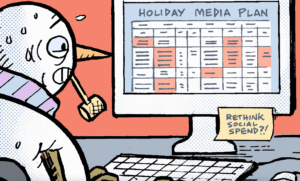 “Data-Driven Thinking” is written by members of the media community and contains fresh ideas on the digital revolution in media.
“Data-Driven Thinking” is written by members of the media community and contains fresh ideas on the digital revolution in media.
Today’s column is written by Jay Friedman, chief operating officer at Goodway Group.
In any case throughout human history where capitalism and markets were suppressed, black markets sprouted and thrived to take their place. North Korea, Cuba and the former USSR each made most or all trade illegal. Making something illegal doesn’t eliminate or even curtail the behavior.
From something as complex as the Enron scandal to something as simple as running a red light, many people agree that some activities should be outlawed and they would voluntarily avoid these activities with or without the law. But why does most everyone agree that running a red light is bad yet the country is divided on other issues, such as marijuana legalization?
More relevantly, why do some in the digital advertising industry clearly think agency kickbacks or gray financials are OK, while others are repulsed by the thought? The answer to this, and the real root cause of the frayed client-agency relationship today, is the moral lens through which each side is looking. It’s the same reasons Republicans and Democrats each think the other is clueless.
This concept is explained in “The Righteous Mind,” a brilliant book focusing on the pillars of morality. The agency-client challenges we’re dealing with here are squarely due to different ways of looking at the fairness/cheating pillar. Clients believe agencies are cheating by taking and making money in ways not explicitly allowed by the contract. Agencies believe clients never intended to pay them fairly, and see kickbacks as a way to right a wrong – a fair outcome in their eyes.
How did you feel reading that last paragraph? An agency person likely felt a pang of anger reading the marketer’s perspective but did an internal fist pump reading the second view. If you’re a marketer, you likely experienced the same feelings in reverse.
The problem with how clients and agencies are approaching this and how the ANA and 4A’s are going about this is that it’s the same way Congress debates a bill. Each side has dug in its heels inextricably deep and is now in debate mode rather than a learning/curiosity mode.
Democrats aren’t wrong. Nor are Republicans. Agencies aren’t wrong, and nor are marketers. The result of each side’s stubbornness and refusal to look through the other side’s lens? Pitchapalooza.
So, how do we solve this? I believe that approaching client-agency relationships one at a time is far more viable than doing so as an industry.
For Agencies
Individual agencies likely have not communicated their value proposition clearly enough to their clients. Clients might think their media knowledge or spec creative is impressive, but neither of these gets clients promoted or internally recognized. Better-than-they-could-have-imagined business results make them an internal hero in their job.
But agencies have to communicate these results through brilliant analytics and insights such that clients can communicate up their chain easily and as an advocate. Clients are putting a large chunk of their own job performance in the agency’s hands.
Agencies must understand during the RFP and pitch stage what success clearly looks like to their primary contacts and show how they’ll deliver that better than anyone. Then show clients how fair pay is the only way they can deliver those results, and that the agency is the only firm that can deliver them.
For Marketers
When marketers sign a contract with an agency and feel like they’ve gotten a good deal, they’ve just seen the beginning of the end of the relationship. Instead, marketers should ask the agency what “great compensation” looks like and outline the results required to earn that amount. If an agency responds by saying those results would require triple their fee, don’t scoff.
Instead, marketers should tell them what results they need to see with the overall business to make it a fair deal. Then, similar to employed salespeople, marketers must understand that not everything is in the agency’s control and there are times where the agency will be paid too much or too little for results they didn’t achieve on their own. That’s how it works when you’re true partners.
We’ve been in a downward spiral of client-agency relationships for decades and the only way to reverse this trend is for both sides to undig their heels, listen to what success means for each other and figure out how to achieve it together – one relationship at a time.
Follow Jay Friedman (@jaymfriedman) and AdExchanger (@adexchanger) on Twitter.










